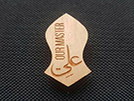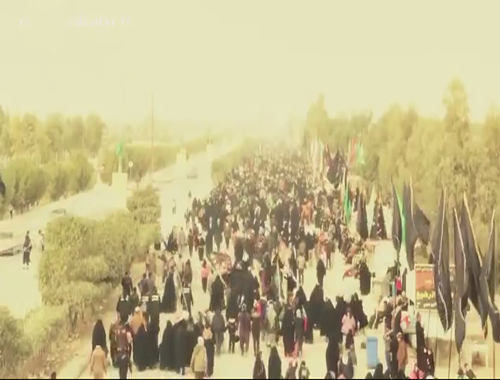Chapter Four Worship
- Details
- Hits: 4345
Chapter Four Worship
Here, by worship we mean worship in the general sense which includes obedience of God, acting upon the injunctions and religious laws (Shariat), remembering God, invocation ('Dua'), seeking forgiveness, contemplating, having sincerity and in general all the aspects of obedience of God.
(*) (Usul-e-Kafi; vol. 2; Pg. 83)
About the importance of worship, suffice it is to say that it has been propounded as the goal of creation.
(*)
“And I have not created the Jinn and the man except that they should serve Me.” (Holy Quran: Zaariyat: 56)
The fundamental role of worship will be clear when the meaning of worship and its diverse dimensions and various effects are clearly explained.
Whatever will be referred to in this place will be the masculine aspect of worship.
After receiving the common guidance from the afore-mentioned ways, man becomes prepared for achieving the special guidance and the journey towards God i.e. more remembrance with regards to innate Ma'refat and a much higher level of heedfulness towards the gifted Ma'refat which has been given to the human beings in the previous worlds.
Now the question which arises is that how and by what means these remembrances and intensification of innate Ma'refat are achievable? Is it possible by producing more imaginations about God? Or it is assured through various ascetism and keeping one's self aloof from the people and going into seclusion?
In this regard, the divine religions have propounded the path of remembrance (of God) through the method of worship and have stated that the only way of journey towards God and His proximity and the only way of achieving the most sublime Ma'aref of God and the highest guidance is through the channel of worship and obedience.
(*)
“…And if you obey him, you are on the right way” (Holy Quran: Nur: 54)
In the verses of Quran and traditions of the Holy Imams worship has been mentioned as
“Remembrance” (Holy Quran: Taha: 14, Jumsh: 9, Maedeh: 91, A'ala: 14 & 15),
“The straigth path” (Holy Quran: Ale-Imran: 51, Zukhruf: 64, Yasin: 61), “The light and splendour of heart” (Dua-e-Kumail, Ghurar al-Hakam, Dharul Kutub, Qum; vol. 2; Pg. 479),
“The pleasure of the lovers” (Ghurar al-Hakam; vol. 1; Pg. 25),
“The path of the Prophets” (Shaikh Saduq 'Al-Khisal' Pg. 621),
“The path of reaching to God” (Behar al-Anwar; vol. 84; Pg. 134) and
“Confession of His Divinity.” (Shaikh Saduq “Elal ush Sharaye,” Pg. 114)
Among the effects of worship we find such expressions as “Guidance” (Holy Quran: Nur: 54 and 'A1-Khisal' Pg. 621),
“Faith and light of Ma'refat” (A1-Khisal; Pg. 621),
“Increase in religion and un-forgetfulness of God” (Elal ush Sharayeh; Pg. 114),
“Fear of God and heartly satisfaction” (Usul-e-Kafi; vol. 2; Pg. 83),
“Salvation” (Holy Quran: A'ala: 14 & 15, Jumah: 10),
“Proximity” (Dua-e-Kumail) and
“Satisfaction of God” (Al-Khisal; Pg. 621) Moreover, the devotees on the path of submission and remembrance have been called under the titles of
“Ahl of God” (Ghurar al Hakam; vol. 1; Pg. 54) and
“Companion of the Beloved”. (Ghurar al-Hakam; vol. 1; Pg. 15)
As such, worship is the path of illumination of the heart, the receiving of the lustre of Ma'refat of God and His remembrance and in short the path of special guidance and the highest recognition of God.
Similarly, prayers and other religious worships are the only way for reaching towards God. Compare this point with the following view: “At the time of unveiling of the inner part and its discovery and opposition with the apparent form of Shariat (religious laws), the duties are rendered null. This is because there exists no duty for the enchanted ones.[38]
The difference of these two sayings is the difference between divine path (reaching to God) and the human path.
From the above discussions, the role of religious precepts and teachings as a path of special guidance and intensification of innate Ma'refat becomes clear in religion and it becomes known that religion without precepts and teachings is imperfect. It is by keeping trace of this discussion and making clear its various angles that one can reveal the firm relation between the gnostic and convictional dimension and the practical and obligational dimension of religion and in the final analysis reach to this conclusion that the teachings of Prophets and Imams (A.S.) are collectively inter-woven and connected to each other while separation between its elements and lack of faith in some will bear no result other than remaining aloof from the school of revelation and stepping on the path of deviation.
Basically, one should confront the assault on culture and the alien information and give reply to their queries. If the Muslim society is possessing some problem it should strive in eliminating it by applying religious jurisprudence (Ijtehad) in religious sources and by taking the temporal and spatial conditions into view. If as a reaction to the cultural assault of the west and the phenomenon of blast of information, this method engages in summarizing religion in ethics or beliefs and deletes or limits the Shariat or shows less importance to it, then not only we have not done any service to religion but have also weakened it.
The matter is not that the (religious) precepts and Shariat are reckoned to be the essence of religion but the whole point is that Shariat and Worship are the only way for reaching to the essence of Ma'refat.
(*)
“And they were not enjoined anything except that they should serve Allah, being sincere to Him in obedience, upright, and keep up prayer and pay the poor-rate, and that is the right religion.” (Holy Quran: Baiyena: 5)


![take advantage of your [present] time](/en/media/com_hwdmediashare/files/99/f5/fb/5293162f4d04afb1ed8da3034e984340.jpg)








